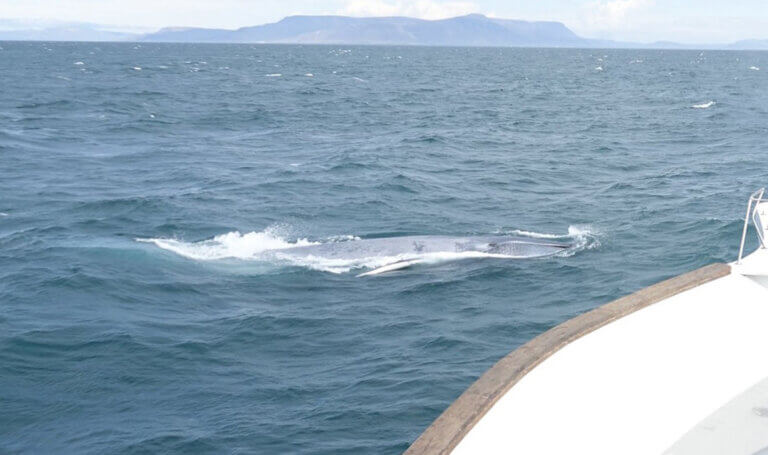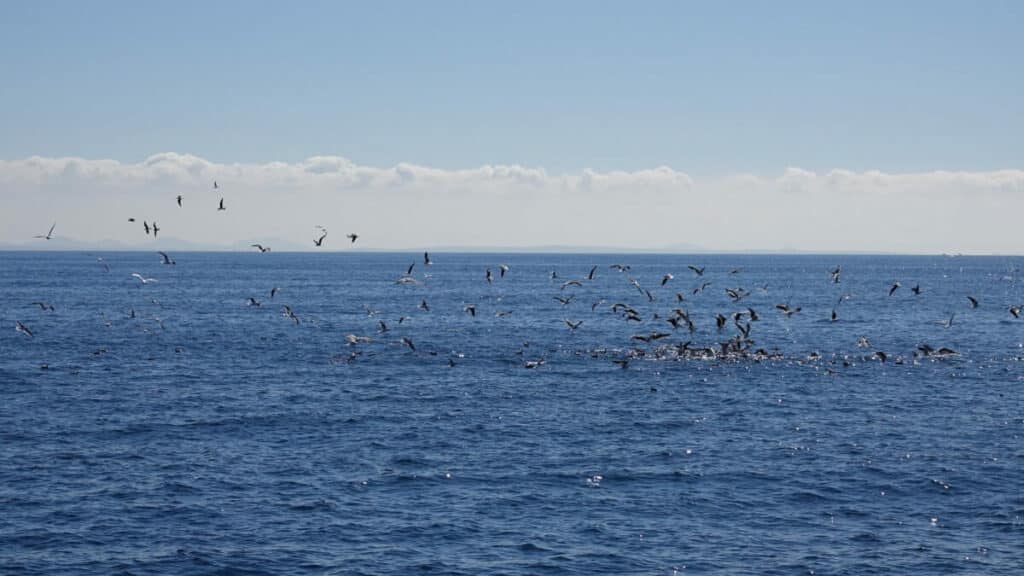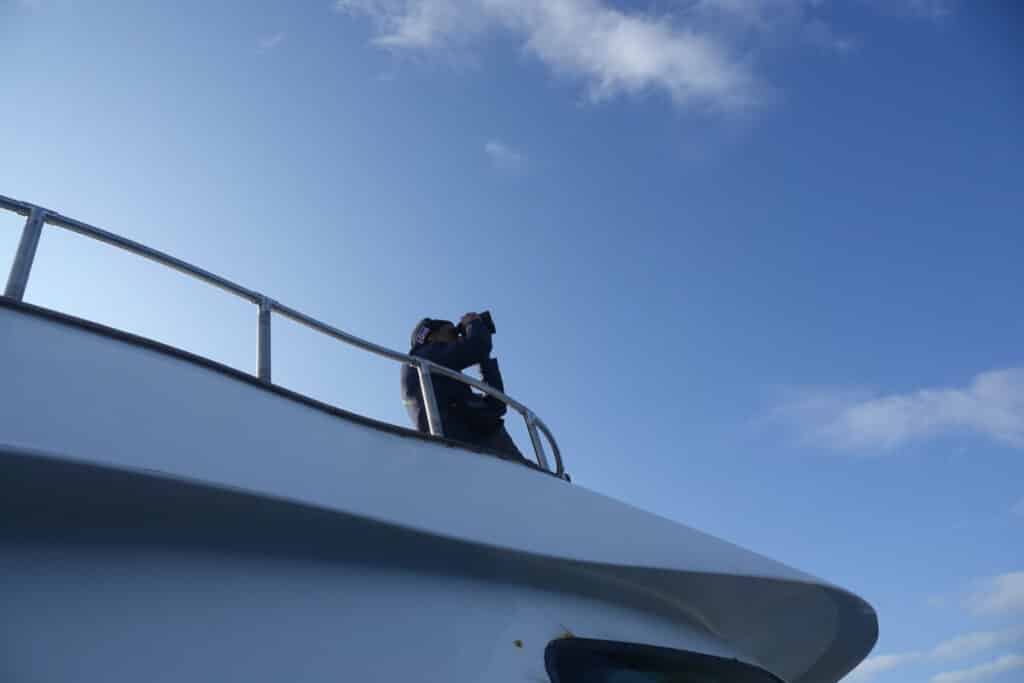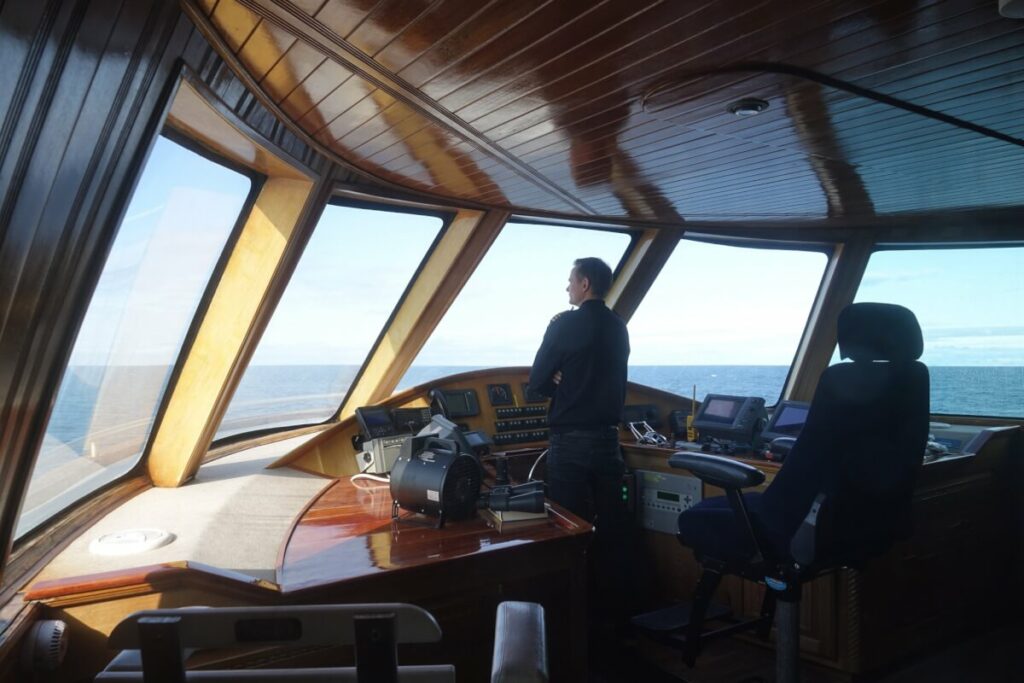10 Ways to Spot a Whale! Whale spotting in Iceland

Whale spotting in Iceland with Sea Trips Reykjavik. 10 brilliant techniques we use to find whales, dolphins and other beautiful animals amongst the waves. We are based in Iceland, but these work everywhere in the world!
Written by Head Guide – Lucky Byfleet
1. Get Up High
The higher up you are the further you can see, and it also means you can see into the valley of waves. That’s why old whaling ships have a big mast even though they don’t have sails, and why our crew spend a lot of time as high on the yachts as they can get! But once we spot a cetacean you can always head down to the front; if there are dolphins they may start to bow ride, and being that close you might hear them vocalise!
2. Look For Birds
Sea birds are beautiful in their own right, and a joy to see, but when whale spotting in Iceland we can also use them to help us spot a whale. The birds feed on the same types of small schooling fish as the cetaceans, and they will dive down into the water sometimes from over 30m up. That means we can see them from far away, and thus be lead to feeding animals. So if you see sea birds have a really good look underneath them, you never know what awesome beastie might be lurking there!

3. When whale spotting in Iceland – Be Patient!
We know, in an ideal world you’d get on to the yacht and just after you have drunk a mug of creamy hot chocolate a humpback whale will breach next to the boat. However, whilst it does happen, we often spend a lot of time waiting. The whales surface to breathe about every 5-10 minutes here, so during the time it is underwater don’t give up, keep your eyes out for signs. It could turn up anywhere around us! When whale spotting in Iceland be prepared with your camera, and wrap up warm!
4. Look for Water Marks
Cetaceans don’t have feet but they can leave footprints! As their powerful tail propels them it creates a pressure wave that leaves a flat circular area on the water above them. In the right conditions you can see a line of these circles, like giant footprints. Wehn whale spotting in Iceland, look for bubbles! Bubbles can come up for many reasons, but some whales, especially humpbacks, will make a bubble ring around a shoal of fish, confusing them and making them swim closer to each other, and therefore easier to feed on.

5. Use Your Nose
If you think your friend has just made a bad smell think again, and look upwind (that means with the wind coming towards your face)! When whales breathe out they can smell pretty bad, like rotting fish and cabbage. Sometimes we call minke whales ‘stinky minkes’ because of this. So keep your nose active and maybe you can spot a whale by the smell!
6. Scan Methodically
When you are scanning the ocean you can lose the place where you saw something. To make sure you are looking properly take a section of water to search, maybe a 90degree portion at the front of the yacht. Then take your eye along the horizon. Upon reaching the other end of your section look a little closer to the boat. Then look along that length. Again and again, look a little closer and go back the other way. Like this zig-zag from the horizon to the boat you are on, then start all over again.
If you do this then you know you have searched an area properly, and, upon seeing something you need binoculars to identify further you will know roughly where you had been looking. You can also look up from what you see to find a cloud or mountain as a reference point behind it, giving you time to grab your binoculars, then you can use that reference point to find that area of water again, ready to call out when you spot a whale!

7. Fins are ‘Fin’tastic!
If you see a fin then brilliant! We love everything with a fin, whales, dolphins, porpoises, and sharks. Even if you didn’t spot a whale we will be delighted at your skills and enthusiasm. We’d rather you accidentally spot a thousand ducks than miss one whale to share with everyone!
8. Listen carefully
Over the sounds of the wind and the waves, we can often hear creatures. Dolphins vocalise with whistles and clicks, sea birds chatter and screech, and whale blows sound like nothing else! We also hear fin slapping and breaches landing with giant crashes on the water surface. The humble porpoise is called ‘sea-pig’ in many languages due to its short sharp blow sounding a bit like a pig. But the Icelandic word for it comes from the Old Norse word for sneeze! Achoo!
9. Big Blows!
As well as hearing blows you can see them, blue whale blows can be 10m tall! Cetaceans are mammals, just like humans. And, like us, their breath is warm and wet. When they breath out that warm wet air gets blasted high into the air, making a visible cloud we can often see. It is easiest to see from big whales on days with little wind.
10. The More the Merrier.
The best way to spot a whale is with friends. The more people looking out the better. As well as knowing the best places to go our crew is always keeping a watchful eye out, even if it’s just through the window at the bar! We also work together with a network of spotters, both on land and on other boats to help us find whales and dolphins. So if we spot a whale we tell the other whale watching boats, and if they spot a whale they tell us, meaning that everyone has a greater chance of seeing them.

We hope that has helped you prepare for your awesome whale watching adventure! Of course, our highly skilled crew will talk you through this when you come out whale watching with Sea Trips Reykjavik here in Iceland. Make sure you have a chat with our guides on the top decks, and with our wonderful captains in the wheelhouses. They are always delighted to share their favourite whale watching moments and want to share their love for these incredible creatures with the world.
Join us on a yacht whale-watching tour or a RIB speedboat tour.

